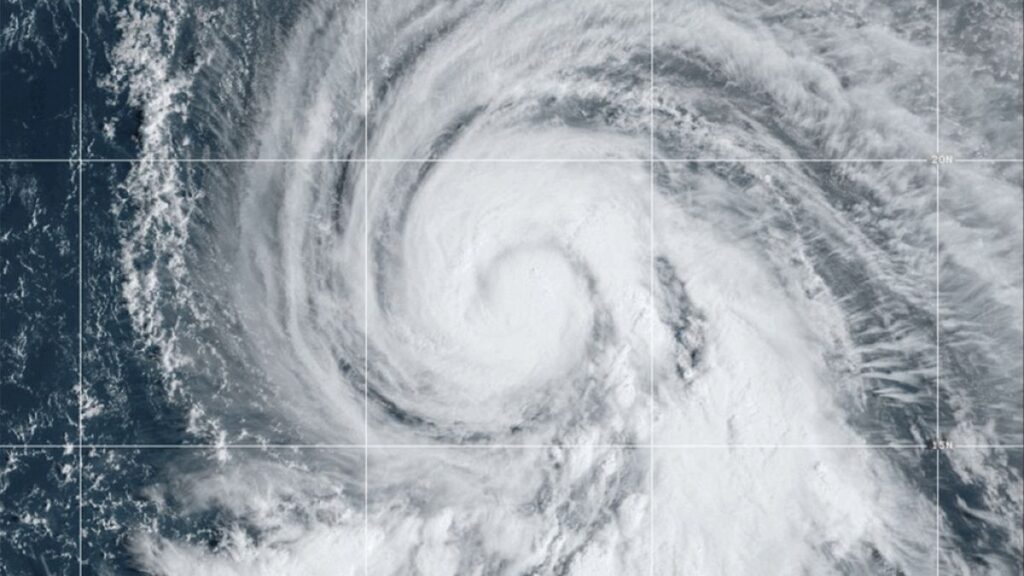While Milton will likely have little to no impact on Europe, another storm – Hurricane Kirk – is making its way west on Tuesday.
While Kirk is no longer classified as a hurricane but an extra-tropical storm, it’s still likely to cause damage and disruption in parts of Europe when it hits this week.
“We are no longer looking at a tropical storm with the typical round, symmetric cloud structure and a calm eye in the centre,” Chartered Meteorologist Lars Lowinski tells Euronews Green, explaining that a storm becomes less “tropical” when it moves away from warm water of this type.
Kirk was a major hurricane to begin with, as it moved between Bermuda in the Caribbean and the Azores in the mid-Atlantic over the weekend. It even reached category 4 status on the Saffir Simpson Scale for a brief time.
Now, it will “remain very strong as it develops into a powerful North Atlantic windstorm like we often see over the North Atlantic and western Europe during autumn and winter,” Lars explains.
Kirk will be the first such system in this season, which typically runs from October to March in Europe.
What impact will Kirk have in Europe?
Arriving on the mainland of Europe, Kirk will likely begin to affect northern Portugal and northwestern Spain from Tuesday night into Wednesday. We could see very strong winds and heavy rain ahead of the main system arriving late on Tuesday.
“The main swath of severe winds will then move through early on Wednesday, with gusts between 100 and 130km/h (65-80mph), but perhaps up to around 145km/h (90mph) over high ground,” Lars says.
“Heavy rain and thunderstorms will also be an issue, with amounts between 100 and 150mm [of rainfall] likely in 24-36 hours in some parts of northwestern Spain.”
Although it’s not clear exactly how much damage it will cause on the west coast of Europe, it will then continue east-north-east and reach France from Wednesday night into early Thursday.
“Very strong winds are likely to affect a large corridor from the Bay of Biscay coast to eastern France, northwest Switzerland and then southwest Germany later on Thursday,” Lars explains. “Peak gusts may well reach 140-150km/h (87-93mph) along coastal parts of western/southwestern France and between 100-130km/h (65-80mph) elsewhere.”
Lars warns, too, that heavy rain will be a threat, mainly across central and northern parts of France. It’s possible that it could stretch into Belgium and western Germany as well, with as much as 100mm of rain falling before late Thursday.
“Kirk is likely to lead to significant impacts from high winds and heavy rain in the aforementioned regions. Wind impacts include tree and roof damage, power outages, blocked roads and rail lines,” Lars explains, “Because trees are in full leaf, impacts from this windstorm in France, Switzerland and Germany will be higher than with similarly strong windstorms in winter.”
Heavy rain could also lead to flash and river flooding and, in the worst cases, possible landslides in mountainous areas.
While high waves and a moderate storm surge could potentially occur along central parts of the Bay of Biscay coast, Lars says the flood risk seems to be fairly low because the surge peak will probably be around low tide.
“Even so, some localised flooding from large waves and high water levels is possible locally in low-lying areas Wednesday night,” he says.
Meteorological experts also say that Kirk may cause hours of heavy rain and strong winds to parts of the United Kingdom – but it’s not yet clear exactly how extensive they might be.
“While it is not unusual to see hurricanes in the tropical Atlantic in October, Kirk [as a hurricane] was unusually intense for a system that far east of the main development area, which is nearer the Caribbean this time of the year,” Lars explains.
“The fact that a storm that intense could develop so far east may indeed be another sign of climate change having an effect as sea surface temperatures are above average over large parts of the North Atlantic,” he adds.
“Warmer oceans means more energy is available to ‘fuel’ these systems, leading to a higher probability of rapid intensification and often higher wind speeds and rainfall amounts as well.”
Lars’ warning comes at the same time as Deep Sky Research, a Montreal-based carbon removal project developer, has published original research on hurricane risk in the United States – which often has an impact on Europe and beyond.
Experts there discovered that there is a plethora of evidence showing how hurricane risk is changing due to climate change.
Perhaps most concerningly, they found that the frequency of deadly hurricane weather has jumped by a staggering 300 per cent.
Severe hurricane rainfall, which causes damages and death, typically used to occur only once every 100 years. Today, it will happen every 25. Deep Sky experts also found that the probability of smaller storms has doubled.
They discovered, too, that the severity of extreme hurricane rainfall has grown 33 per cent.
Further still, not only has the frequency of extreme hurricane rainfall increased, but the maximum severity is growing as well.
The experts also estimated that hurricanes could cost more than $450 billion (€410b) in the next five years in the US alone – a 50 per cent increase on previous figures.
“Many of the impacts of climate change are slow-moving, but some will be devastating in their rapid escalation. We will see the impacts of worsening hurricanes not in the next 50 years, but in the next five,” a spokesperson for Deep Sky explains, “This will mean billions of dollars in damages, hundreds of thousands of homes destroyed, and many lives lost.”
Source link : https://www.euronews.com/green/2024/10/08/what-impact-will-hurricane-kirk-have-on-mainland-europe-experts-weigh-in
Author :
Publish date : 2024-10-08 10:31:27
Copyright for syndicated content belongs to the linked Source.
